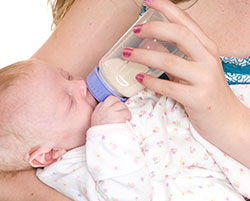Works instantly for my baby! Sigh of relief for both baby and me thank you
We take it with us everywhere. So good to have a back up if our little one is struggling.

The five usual medical causes of the "hurting baby" are:
1. Gastroesophageal reflux disease (GERD). In our experience, this is the most common cause of "colic." The regurgitated stomach acid causes "heartburn." Clues from GERD are:
2. Overactive let-down of breast milk. Some breasts respond "too well" to Baby and release a rush of milk during the first few minutes of a feed. Baby gulps his way through, swallows too much air, and gets gas pains. This "fore" milk is also higher in lactose sugar than the high-fat "hind" milk, which also creates more gas during digestion. Talk to a lactation consultant, or call La Leche League (1-800-LA-LECHE) for tips on how to slow your let-down and increase hind milk.
3. Food sensitivities to a breastfeeding mother’s diet. Sensitivities to foods in a breastfeeding mother’s diet is next on the list of hidden causes of "colic." Although there may be others, in our experience the following are the most common fuss foods that breastfeeding mothers report:
Here are some clues that your baby may be sensitive to a food in Mother’s diet:
If Baby is still severely colicky even after eliminating the most suspect fuss foods from Mother’s diet, try the following more drastic elimination diet. Most mothers should not go to this extreme unless they have to. They may become undernourished themselves. Mothers of colicky babies need extra energy, not less.
"Then can I eat a regular diet again?" Mother may wonder. Most breastfeeding babies will outgrow their food sensiti,ities by eight months of age, when the intestinal lining is more mature and able to screen out offending allergens. But the timing and response to food allergens varies widely from baby to baby.

4. Formula Allergies. Babies may have intestinal sensitivities and show colicky behavior after ingesting two ingredients in some infant formulas: cow’s milk proteins and lactose sugar. If a formula allergy is suspected based on the breastfeeding sensitivity behavioral clues listed here, try the following steps in consultation with your baby’s doctor:
5. Sensory Processing Disorder (SPD). Although most babies with colic probably don’t have sensory processing disorder (SPD), this newly recognized developmental disorder (also known as sensory integration disorder) may play a role in causing colicky symptoms in some infants. In SPD, an infant’s brain can’t correctly process certain types of sensations, so many of the normal sensations of daily life can be irritating rather than comforting to a baby’s brain. Instead of being soothed by swaddling or snuggling, for example, a baby with SPD may be overstimulated and irritated by feelings of confinement and want to be able to move more freely. He may prefer to be held upright instead of in a cradle position. The feeling of clothing against a baby’s skin may be irritating and cause a baby to feel restless, especially at night. Sounds may startle a baby with SPD, and a loud, chaotic environment can cause nervous and insecure feelings. The constant irritation and overstimulation that the brain of a baby with SPD has to deal with can result in colicky symptoms throughout the day. Fortunately, SPD is treatable with sensory integration occupational therapy.
In our practice we find that the above steps help most cases of colic improve or resolve. But some babies won’t show much improvement, despite all efforts. Some colic may not be caused by food, formula, or reflux problems at all. Fortunately, most babies get much better by four months of age as the intestines mature, so if you can’t seem to figure out why your baby is fussy, you can be reassured that things should get better soon.
4.98 / 5.0
(3546) 3546 total reviews
4.78 / 5.0
(49) 49 total reviews
4.53 / 5.0
(113) 113 total reviews
Subscribe to our mailing list to stay in the loop on exclusive promotions, new product launches, and expert parenting tips - delivered straight to your inbox every month!

Colic Calm's unique formula targets colic-related issues and provides fast-acting relief for babies.
Receive updates on new product releases, exclusive offers and more.
2025 Colic Calm. All Rights Reserved.
* These statements have not been evaluated by the Food and Drug Administration. This product is not intended to diagnose, treat, cure or prevent any disease. ** The information on this website is presented for educational purposes only and is not medical advice. Always consult a doctor with any questions regarding your child’s health concerns. *** Unless otherwise indicated, the individuals depicted on this site are models used for illustrative purposes only.
Works instantly for my baby! Sigh of relief for both baby and me thank you
We take it with us everywhere. So good to have a back up if our little one is struggling.
Your product is a wonderful thank you very much
Your product is a wonderful thank you very much
Your product is a wonderful thank you very much
